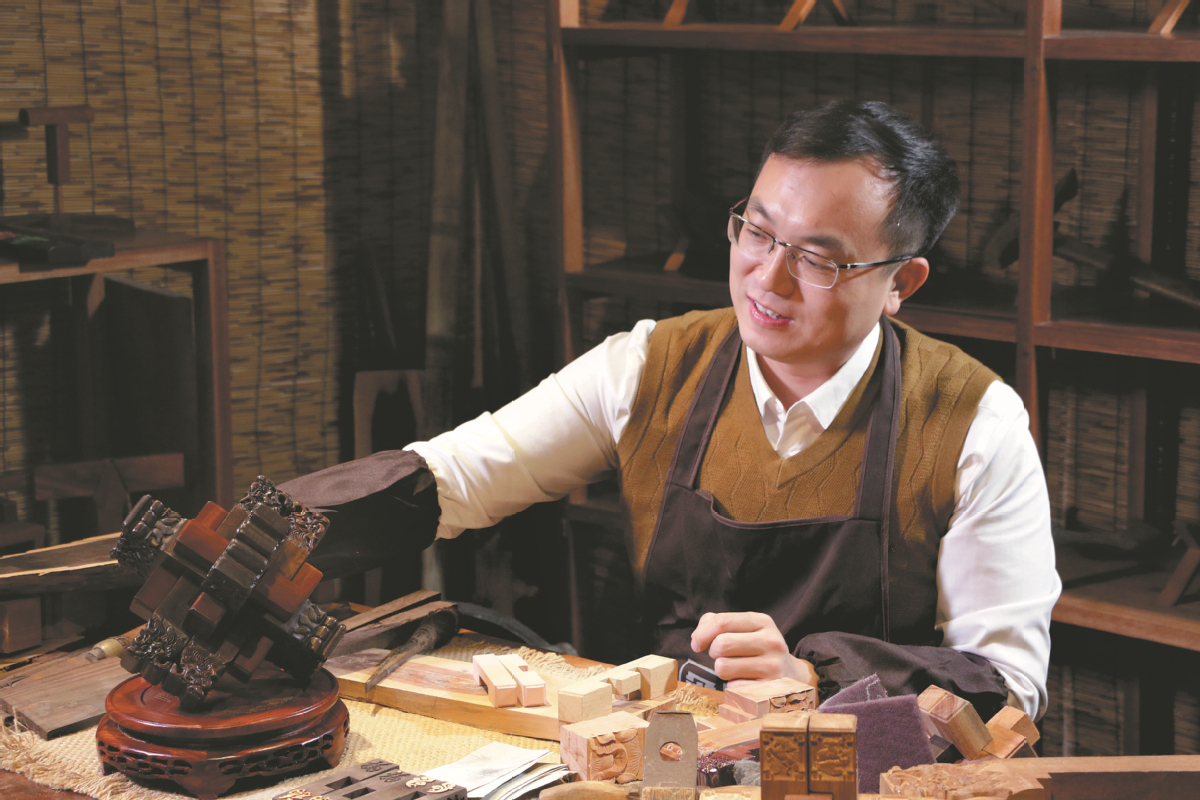
Li Hao works in his workshop on the Luban lock in Tengzhou, Shandong province. CHINA DAILY
While demonstrating how to disassemble and reassemble a Luban lock, Li Hao, an inheritor of Luban lock-making techniques in Tengzhou, Shandong province, shared the history of this traditional Chinese folk educational puzzle and the ancient wisdom embedded in its structure.
"It's easy to take apart but challenging to reassemble, and that is the major feature of it," said Li, 39.
The Luban lock is believed to have been created by Lu Ban, a structural engineer known as the "father of carpentry" in China who lived during the Spring and Autumn Period (770-476 BC).
The design of the Luban lock incorporates concave and convex parts that interlock seamlessly, drawing inspiration from the mortise and tenon joints used in ancient Chinese wooden architecture and furniture, Li said.
After dedicating 10 years to developing the Luban lock by blending tradition with innovation, Li has transformed it into a creative cultural product that has contributed to the local cultural and tourism industry.
His company has created over 100 variations of the toy and has provided employment for more than 100 villagers in Jisuo town, with orders coming in from overseas as well.
In addition to the traditional six-rod lock, Li's team has designed a 24-rod lock adorned with patterns depicting elements of Tengzhou culture. By utilizing hardwoods such as rosewood and incorporating techniques such as inlaying silver wire, they have transformed the puzzle into a trendy cultural and creative product.
Despite encountering challenges and setbacks in his innovations, Li said the experience he has gained from his determination to overcome those obstacles has enriched his life. His journey to establish his company began in 2009, when he started working as a village official in Jisuo with a mission to enhance the lives of the residents. The inspiration to develop the Luban lock as an educational toy struck him in 2010 when he saw a large one at the Shanghai World Expo.
"Tengzhou is the birthplace of Lu Ban, so why don't we develop the Luban lock as a toy that will not only educate villagers, but also serve as a way to preserve the wisdom of our ancestors?" he thought at the time.
He went to Jia Fuming, a local master woodworker, to learn carpentry techniques. Being skeptical of a college student's interest in learning this traditional craft, Jia rejected Li, believing his enthusiasm would be short-lived.
But Li was persistent and visited Jia several more times before eventually winning him over.
Starting from scratch, they worked together to produce a Luban lock within six months.
With support from the Jisuo government, Li secured a 50,000 yuan ($7,000) loan and established a woodworking company, marking the beginning of their efforts to produce the Luban lock on a mass scale.
After finding initial production success, he encountered new challenges related to marketing and working capital, and the first batch of Luban locks made sat unsold in a warehouse. "We had been focusing on developing the product, but we ignored the marketing work," he said.
Li began participating in several trade fairs where the Luban lock was more well-known, and it soon became a sought-after product.
To further expand the company's production scale and create more employment opportunities, the town government helped him secure a 2,000-square-meter workshop.
He also obtained another loan for 300,000 yuan and raised over 1 million yuan to purchase woodworking equipment and high-quality wood materials, and to hire professional technicians to enhance the production process.
By 2011, the company was able to double its production capacity. Last year the sales reached 30 million yuan.
The impact of this initiative is evident in the lives of villagers like Kong Lingmei, who is responsible for polishing the wood used at Li's company.
By working at the company, Kong earns a stable income of around 3,000 yuan per month.
Recognizing the cultural significance of the Luban lock, the Zaozhuang government, which administers Tengzhou, has been organizing competitions focused on the design assembly-disassembly of the puzzle to promote its ancient wisdom and expand its reach.
"As our country increasingly values the preservation and inheritance of traditional culture, I believe the future of the Luban lock is promising," Li said.
原稿链接:https://enapp.chinadaily.com.cn/a/202402/26/AP65dbf3bfa310115ef066c655.html







 鲁公网安备 37048102001001号
鲁公网安备 37048102001001号
